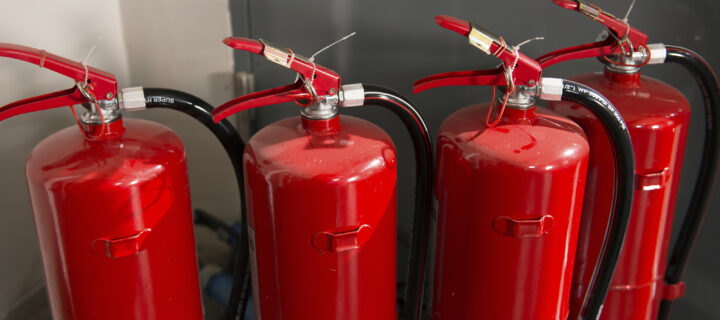
Introduction
Fire safety is a crucial aspect of workplace safety, and businesses have a responsibility to protect their employees, customers, and assets from fire-related hazards. Fire extinguishers play a critical role in fire prevention and emergency response, but are they legally required for all businesses? This guide explores fire extinguisher regulations, the importance of fire safety, and practical steps businesses can take to comply with legal requirements while ensuring workplace safety.
The Legal Requirements for Fire Extinguishers in Businesses
OSHA and NFPA Standards
In the United States, fire extinguisher regulations for businesses are primarily governed by the Occupational Safety and Health Administration (OSHA) and the National Fire Protection Association (NFPA).
- OSHA Standards (29 CFR 1910.157): This regulation mandates that businesses provide portable fire extinguishers and ensure they are properly maintained if they are required for employee use.
- NFPA 10 Standard for Portable Fire Extinguishers: NFPA 10 sets requirements for the selection, placement, inspection, maintenance, and testing of portable fire extinguishers.
Local Fire Codes and Regulations
State and local fire codes often impose additional fire safety requirements. These codes are typically enforced by fire departments and local authorities, and they can vary depending on the type of business, building size, and occupancy type. Businesses should consult local fire codes to ensure compliance.
Do All Businesses Need Fire Extinguishers?
Businesses That Are Legally Required to Have Fire Extinguishers
While fire extinguishers are a fundamental component of fire safety, certain businesses have a legal obligation to have them based on industry-specific regulations:
- Businesses with Employees: OSHA requires that any workplace where employees work with or around potential fire hazards must have accessible fire extinguishers.
- Retail and Commercial Establishments: Stores, malls, and office buildings must have fire extinguishers placed in key locations to comply with NFPA and local fire codes.
- Restaurants and Commercial Kitchens: Due to the high risk of grease fires, restaurants must have Class K fire extinguishers designed for kitchen fires.
- Industrial Facilities: Factories, warehouses, and manufacturing plants must have fire extinguishers suited for chemical and electrical fires.
- Educational Institutions and Healthcare Facilities: Schools, hospitals, and nursing homes require fire extinguishers to protect vulnerable populations.
Businesses That May Not Be Required to Have Fire Extinguishers
Some businesses may not be legally required to maintain fire extinguishers if they meet alternative safety provisions. Examples include:
- Home-Based Businesses: Sole proprietors working from home may not need commercial fire safety measures, although it is still recommended.
- Fully Sprinklered Buildings: In some cases, businesses located in buildings equipped with automatic sprinkler systems may be exempt from certain fire extinguisher requirements.
- Remote and Low-Risk Workplaces: Businesses without significant fire hazards, such as small administrative offices, may have minimal fire safety obligations.
Why Fire Extinguishers Are Important for Business Safety
Even if a business is not legally required to have fire extinguishers, they remain a crucial safety investment. Here’s why:
Immediate Fire Control
Fire extinguishers provide employees with the ability to control small fires before they escalate, reducing potential damage and injury.
Employee and Customer Safety
A well-equipped workplace enhances overall safety, protecting employees, customers, and visitors from fire-related risks.
Compliance and Liability Protection
Failure to provide adequate fire protection can lead to legal consequences, insurance penalties, and financial liabilities in case of fire-related incidents.
Choosing the Right Fire Extinguisher for Your Business
Different types of fires require specific types of fire extinguishers. Businesses must select the right type based on their operational risks.
Fire Extinguisher Classifications
- Class A: Suitable for fires involving ordinary combustibles such as wood, paper, and cloth.
- Class B: Designed for flammable liquids like gasoline, oil, and paint.
- Class C: Used for electrical fires involving wiring, outlets, and appliances.
- Class D: Required for combustible metals, often used in industrial settings.
- Class K: Specifically designed for commercial kitchens to extinguish grease fires.
Placement and Accessibility
- Fire extinguishers should be easily accessible, mounted at appropriate heights, and placed in high-risk areas.
- NFPA recommends fire extinguishers be placed no more than 75 feet apart for Class A fires and 50 feet apart for Class B fires.
- Commercial kitchens should have a Class K extinguisher within 30 feet of cooking appliances.
Fire Extinguisher Maintenance and Employee Training
Regular Inspections and Maintenance
- Fire extinguishers must be inspected monthly by employees and annually by a certified professional.
- They should be serviced or replaced if they show signs of damage, corrosion, or discharge.
- Hydrostatic testing should be performed per NFPA 10 guidelines.
Employee Training on Fire Safety
- Employees should be trained to locate and operate fire extinguishers properly.
- Training should cover the PASS Method:
- Pull the pin
- Aim the nozzle at the base of the fire
- Squeeze the handle
- Sweep from side to side
- Conducting fire drills and safety briefings can improve emergency preparedness.
Additional Fire Safety Measures for Businesses
While fire extinguishers are essential, businesses should implement other fire prevention strategies:
- Fire Alarms and Detection Systems: Ensure smoke detectors, alarms, and sprinkler systems are functional.
- Fire Exits and Evacuation Plans: Clearly mark exit routes and conduct regular fire drills.
- Proper Storage of Flammable Materials: Follow OSHA and NFPA guidelines for storing hazardous materials.
- Emergency Lighting and Signage: Maintain illuminated exit signs for quick evacuations.
Conclusion
Fire extinguishers are a vital component of workplace safety, and most businesses are legally required to have them. Even in cases where they are not mandatory, investing in fire extinguishers and employee training can save lives and protect assets. Business owners should stay informed about local fire codes, maintain regular safety inspections, and implement comprehensive fire prevention measures to ensure a secure work environment. Prioritizing fire safety is not just a regulatory necessity but a responsible business practice that enhances overall workplace security.
